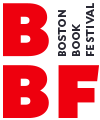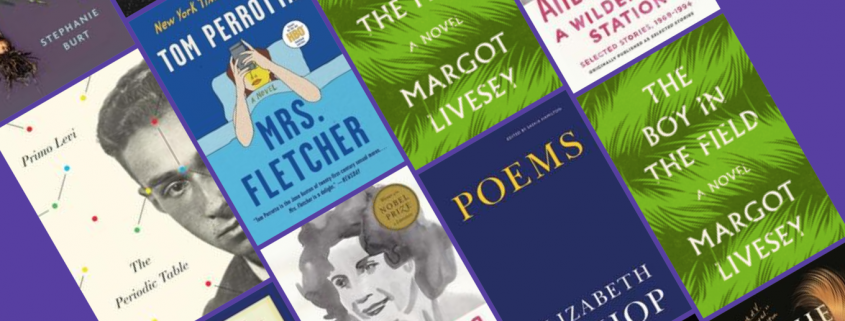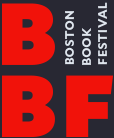There’s a Book for That: Comfort Reading Recommendations from BBF Presenters
During these unprecedented and scary times, books can offer us wisdom, comfort, and other worlds to escape to, even for just a few hours. Ahead of our virtual There’s A Book For That: Bibliotherapy Event on April 23, we asked past Boston Book Festival presenters what books they turn to in times of trouble; here’s what they’ve been reaching for these past few weeks.
Anna Solomon
Anna’s newest book, The Book of V., will be released May 5.
Selected Stories by Alice Munro
This one feels almost too obvious, but so it goes . . . there’s nothing like an Alice Munro story when I want to slip effortlessly out of my reality and into someone else’s. They’re so perfect, on a craft level, that even when they involve murder I find them somehow soothing. Plus you can read a Munro story backwards and upside down and it will still work, which makes for ideal reading during this peripatetic, time-bending time.
Tom Perrotta
Tom’s most recent novel, Mrs. Fletcher, is a New York Times bestseller and was adapted into an HBO series in 2019.
The Periodic Table by Primo Levi
One book I return to in unsettling times is The Periodic Table by Primo Levi. It’s a memoir of Levi’s life as a chemist, and every page radiates humor, compassion, resilience, and a deep respect for scientific truth, all of which we could really use right now.
Margot Livesey
Margot’s newest book, The Boy in the Field, will be released August 11.
The Beginning of Spring by Penelope Fitzgerald
When it became clear that I was not going to be leaving my house much in the near future, I reached for Penelope Fitzgerald’s The Beginning of Spring, first published in 1988. From the opening sentence—“In 1913 the journey from Moscow to Charing Cross, changing at Warsaw, cost fourteen pounds, six shillings and threepence and took two and a half days”—I feel myself reliably transported to another world. The novel is set mostly in Moscow in 1913 and it succeeds in being both slyly funny and deeply mysterious. It reveals itself like one of those sets of Russian dolls—one mystery hiding another—and almost all of them eluding the novel’s protagonist Frank Reid, one of those decent, repressed Englishmen for whom Fitzgerald has a weakness and, I’ll confess, I do too. The novel feels, in the best way, like an escape from and a window into the world around me.
Jasmine Guillory
Jasmine’s newest novel, Party of Two, will be released June 23.
Betsy-Tacy by Maud Hart Lovelace
In difficult times, I often reach for books I loved and read over and over again as a child. The familiarity of the book soothes me, and invariably I discover something (either in the language, the situation, or the historical context of the book) when I reread it as an adult that I didn’t realize as a child. But even if you’ve never read them before, the Betsy-Tacy books are perfect for this moment–they’re about two little girls who become friends when they’re five, and the series takes them to their early twenties (and the outbreak of World War I). They are joyful, charming, and fun to read, and help me escape into another time, if only for a little while.
Stephanie Burt
Stephanie’s latest book, Don’t Read Poetry: A Book About How to Read Poems, was released last May.
On a Sunbeam by Tillie Walden (also a past BBF presenter!)
On a Sunbeam is a book-length queer teen space adventure graphic novel by my favorite independent comics artist: you can read it as a big physical book, which I recommend, or online if you’re up for a long online read. It features close working relationships, lesbian space teams who act like pirates but actually perform needed interstellar infrastructure maintenance, a story of lost and found love at a boarding school, gorgeous sweeping vistas (think Miyazaki), lots of adventure but very little violence, and they travel from planet to planet in giant flying fish. Oh, and there’s a non-speaking autistic-coded nonbinary character who has a robust social and romantic life and saves everyone’s bacon several times. Walden has said that she drew the space universe that she wanted to see: I’d like to see it again and again, and maybe to live there, too.
This rec would be too obvious to offer for an all-poetry, all-the-time-audience—it would be like telling music writers that Prince is great—but if you’re not already somebody who reads a lot of modern poems, you owe it to yourself and your socially distanced, tenuously hopeful self to pick up (or peruse on-screen) the poems of Elizabeth Bishop. Be sure you’re reading the poems that she published in her lifetime, not the big stack of posthumously published drafts. Start with the first poem in her first book, “The Map” (“Land lies in water; it is shadowed green”) and zoom all the way to the last few poems she finished (“Caught—the bubble/ in the spirit-level;/ a creature divided”) and you’ll get the most careful, reliable observer—of her own moods, of apprehension and nostalgia and melancholy and occasional joy; of Nova Scotia; of New England; of Brazil—who has ever written modern verse in English. You’ll get someone who figured out how to find love and how to think about losing love—the art of losing, as you may have heard, isn’t hard to master. Warning: you’ll also get a poet who told one of her closest friends, “when you write my epitaph, you must say I was the loneliest person who ever lived.”
And if you’re looking for goofy older poetry, why not reread—I do—Lord Byron’s Don Juan? Snark about everything, joke after joke (especially against calcified power structures), and endless quadruple-barreled rhymes tell the story of a hapless young man who just can’t help finding himself in one, and then another, and then another, country lady’s bed. Published in salacious installments from 1819 through the early 1820s, the narrative poem was a massive hit at the time, and no wonder. There’s a lot of this long poem, more segments than you can or should read in one sitting—start with Canto I and see how it goes. Byron promises to “begin at the beginning,” as Juan (pronounced joo-an), his future as a ridiculous military anti-hero well before him, “learned the arts of riding, fencing, gunnery/ And how to scale a fortress—or a nunnery.”
Check out the full list of recommended comfort reads–and support independent bookstores when you purchase–on our Bookshop list.
Register for our Bibliotherapy Event today, and perhaps you’ll discover some more new favorites for reflection or escape!




